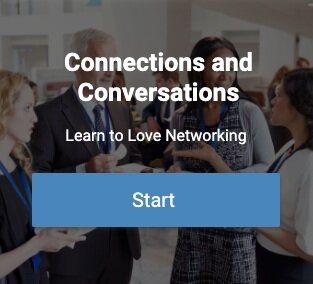There are four stages to good networking: Research, approach, follow-up, and request. It’s important to follow this sequential order to get good at networking and foster healthy relationships.
Research
Let’s talk about research first. Research enables you to identify the people you want to network with. There are several ways to go about this. Talk to other people. Find out what groups and organizations they belong to. Subscribe to local news publications for word on people you may want to connect with. Start with inviting them to join your LinkedIn network.
Approach
Next is approach. Take great care with this step. First impressions are important. Practice. Three key networking skills to exercise to increase your competency include communication, active listening, and empathy.
Communication:
Communication is the act of being clear and exchanging information from one person to another. Good communication is essential to developing and maintaining relationships with others. Don’t be scripted, but be prepared to clearly communicate an overview of the story you are inviting people into in 30 seconds or less when introducing yourself.
Active Listening:
Active listening is by far one of the most important networking skills. Seek to understand before being understood. To get people excited about you and what you’re sharing with them, you need to understand their needs first. Active listening involves maintaining eye contact, practicing body language, such as nodding your head to show you understand what the other person is saying, and asking the right questions to keep the conversation going.
Empathy:
Rounding out key networking skills is empathy. Empathy is the skill you use to connect to other people, but before you can connect with others you have to be able to connect with yourself first. Empathy is about feeling what another person is feeling. In order to do this, you have to be able to recognize the feeling and connect your experience with whatever the feeling is. Empathy skills are important for networking because they make others feel that you understand and can relate to their emotions and experiences.
The best way to practice and build your networking competencies is to improve communication habits. Toastmasters is a great organization to help with this. Additionally, ask friends for feedback. Understanding what you’re doing well and what you can improve can have a big impact on your networking skills. And just putting yourself out there on a regular basis by attending networking events, virtual or in-person, is always good for honing your skills.
Follow-Up
That brings us to follow-up. Follow-up is a step that helps relationships grow, but often gets neglected. It’s a simple step that represents care, accountability, and integrity.
Networking is not about short-term gain. It’s about learning, growing, and building relationships. And it does not have to be strictly career related. Consider participating in events that are just about things you are interested in, for example a book club. The more people you meet with fresh perspectives, the better your chances are of learning something new and the broader your base for connecting and helping others.
One of the most meaningful ways to follow up is to simply say, “thank you.” Thank the person for their time meeting with you, for information they shared, for the referral they made.
Similarly, give a results update. People like to know that they’ve helped.
Send seasonal greetings. I’m especially fond of sending cards at Thanksgiving.
If you see an article that you believe would be of interest to someone in your network, send it to them. They will appreciate you thinking of them and that you understand what is important to them. Likewise, book recommendations are also a thoughtful touch.
Additionally, mark significant life events with a card. Everyone likes well timed, meaningful greetings that let them know they are appreciated and cared for.
Follow your instincts. Sometimes a person pops into your head. Call to simply say hello or send an email letting them know you’re thinking of them.
Building relationships with pure intentions can be very fun and joyful.
Requests
Finally, when it comes to making requests, invest in your network and your network will invest in you. People who know, like, and trust you, and if asked, will help. Different problems and goals need the brainpower of different connections. Be thoughtful about what you request and of whom you make the request. People are giving their time and energy to help and, in some sense, putting their reputation on the line.
Getting good at networking is a practice of the heart and the mind. The only way to get good at it is to engage with it. Networking does not have to be difficult or uncomfortable. It can be a very fun and joyful experience when led with care.
Coming Soon!
Sign up to be the first to know when the course is released.

